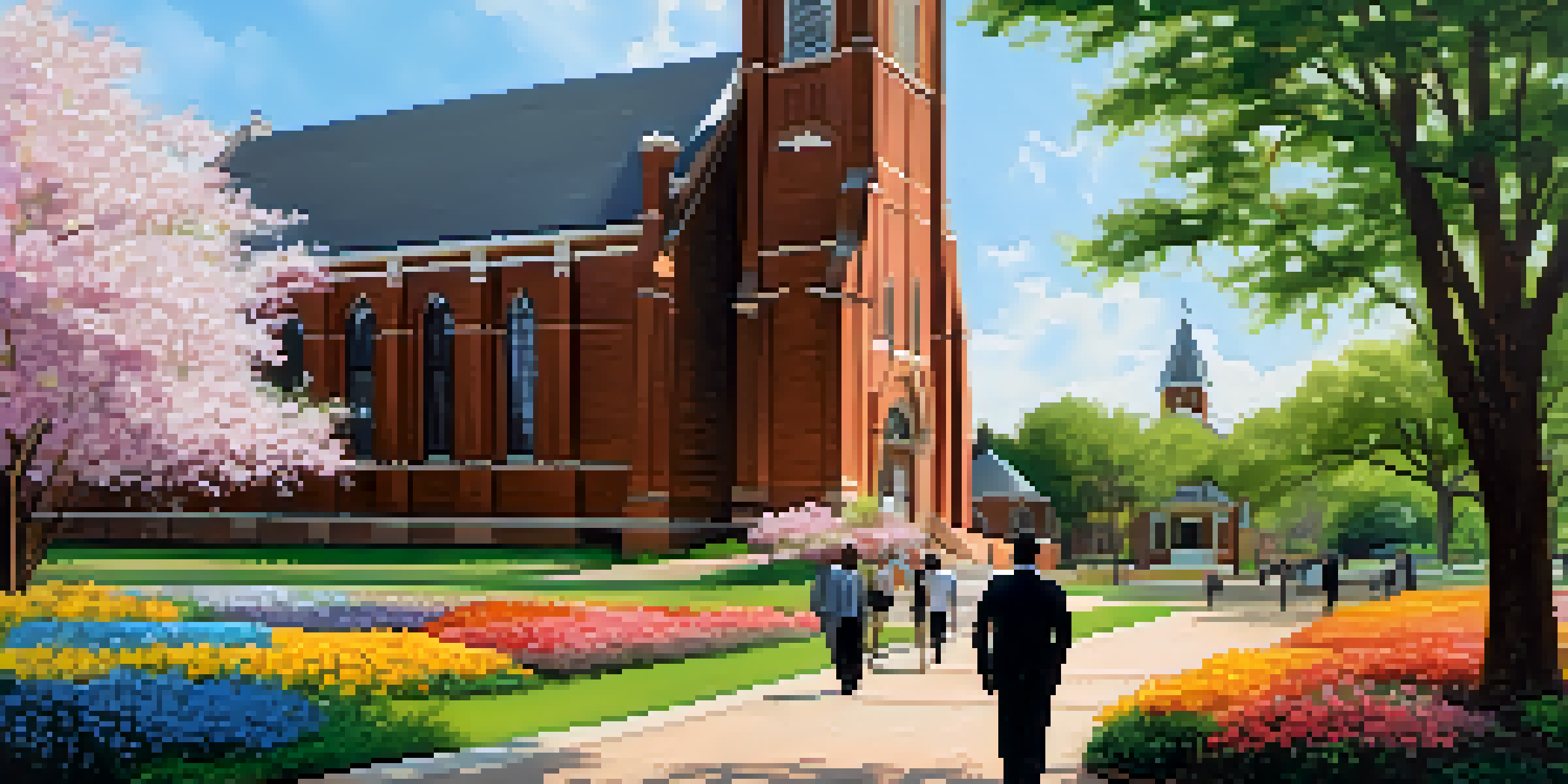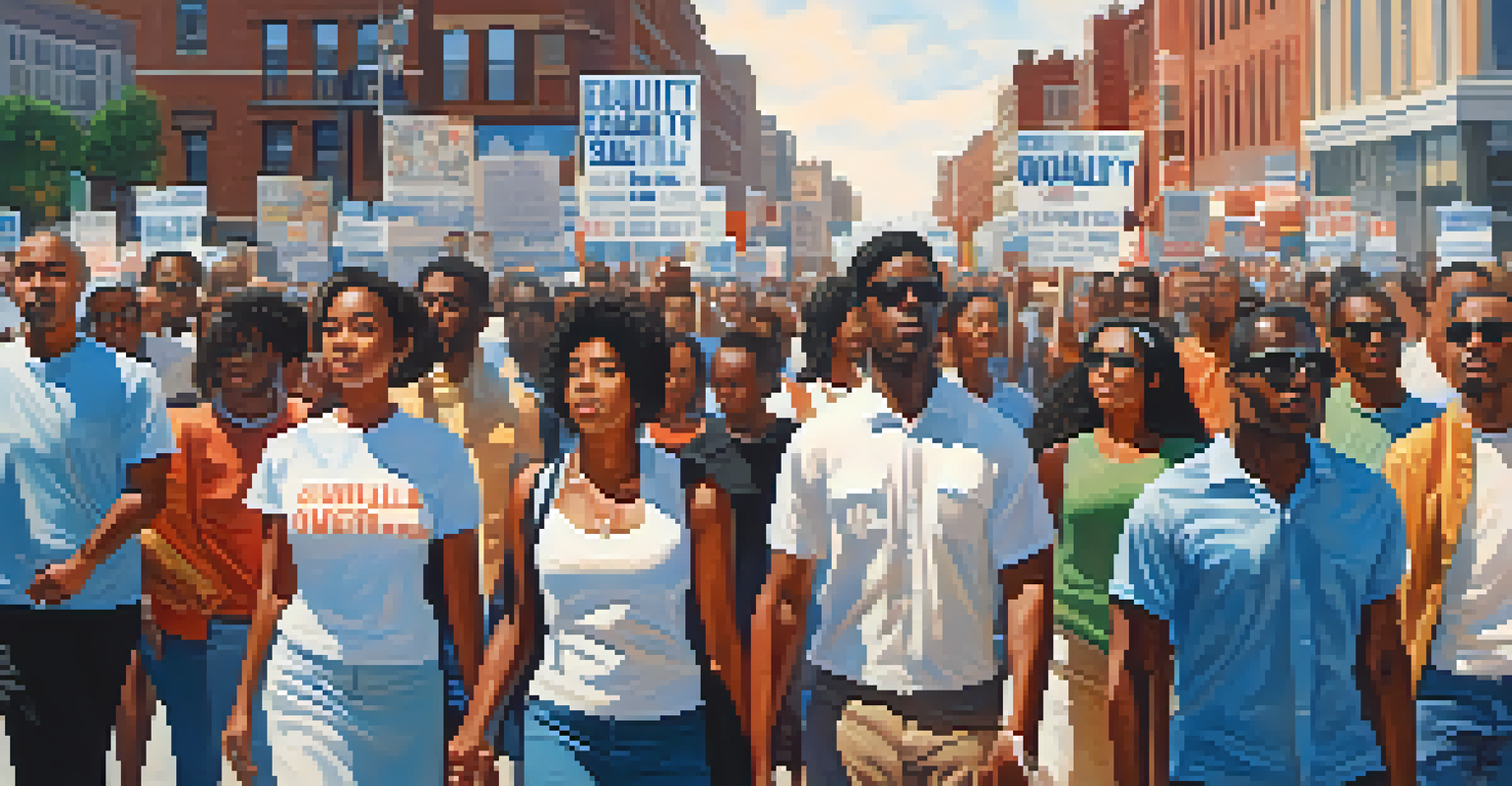Martin Luther King Jr.: The Legacy of an Atlanta Icon

The Early Life of Martin Luther King Jr. in Atlanta
Martin Luther King Jr. was born on January 15, 1929, in Atlanta, Georgia. Growing up in a vibrant community rich in culture and history, young Martin was influenced by his family's deep roots in the church. His father, a prominent pastor, instilled in him the values of faith, education, and social justice, which would later shape his life's work.
Injustice anywhere is a threat to justice everywhere.
King's early experiences in Atlanta, particularly witnessing racial segregation and injustice, fueled his desire for change. Schools were segregated, and public facilities were often separate but decidedly unequal. These formative years planted the seeds of activism that would blossom in his adult life.
As a student at Morehouse College, King further developed his leadership skills and commitment to civil rights. His time in Atlanta not only shaped his worldview but also connected him with influential mentors, including Benjamin Mays, who inspired him to pursue nonviolent resistance as a means to combat oppression.
The Rise of a Civil Rights Leader
King's rise to prominence began with the Montgomery Bus Boycott in 1955, a pivotal event that showcased his leadership and dedication to nonviolent protest. This successful boycott not only challenged segregation laws but also ignited a national movement for civil rights. King's ability to inspire others played a key role in mobilizing support across the country.

As the president of the Southern Christian Leadership Conference (SCLC), King utilized his platform to advocate for social justice and equality. He traveled extensively, delivering powerful speeches that resonated with people from all walks of life. His famous "I Have a Dream" speech during the 1963 March on Washington encapsulated the aspirations of countless Americans yearning for change.
King's Early Life Shaped Activism
Growing up in Atlanta, Martin Luther King Jr. was influenced by his family's values and experiences with racial injustice, laying the foundation for his future activism.
King's commitment to nonviolence and peaceful protest was a cornerstone of his leadership. He believed that love and understanding could transcend hate and division, a message that still resonates today. This philosophy not only defined his approach but also attracted a diverse coalition of supporters to the civil rights movement.
King's Impact on Atlanta and Beyond
Martin Luther King Jr.'s legacy is deeply intertwined with the history of Atlanta. His efforts helped to initiate significant changes in the city, paving the way for greater equality and civil rights. The establishment of institutions like the King Center in Atlanta serves as a testament to his enduring impact.
Faith is taking the first step even when you don't see the whole staircase.
In addition to local changes, King's work inspired movements across the nation and around the world. His principles of nonviolence influenced leaders in various struggles for justice, including those in South Africa and India. The global reach of his vision for equality showcases the lasting nature of his message.
King's legacy continues to be celebrated, with Atlanta hosting numerous events and memorials in his honor. Each year, thousands gather to reflect on his contributions and recommit to the ideals he championed. His work remains a powerful reminder of the ongoing struggle for justice and equality.
The Role of Faith in King's Mission
Faith was a driving force in Martin Luther King Jr.'s life and work. Rooted in his upbringing, his Christian beliefs provided both inspiration and guidance as he faced the challenges of the civil rights movement. King often drew on his faith to reinforce his commitment to nonviolence and social justice.
His sermons and speeches frequently echoed biblical themes, emphasizing love, forgiveness, and the inherent worth of every individual. This spiritual foundation allowed him to connect with diverse audiences, fostering a sense of unity in the struggle for equality. King's ability to intertwine faith with activism was instrumental in mobilizing support.
Nonviolence Defined King's Approach
Inspired by Gandhi, King's commitment to nonviolence became a cornerstone of his civil rights philosophy, leading to significant legislative changes.
Despite the immense pressures and dangers he faced, King remained steadfast in his belief that love would ultimately triumph over hate. This conviction not only empowered him but also resonated with countless others who joined the movement. His legacy reminds us of the transformative power of faith in the pursuit of justice.
The Importance of Nonviolence in King's Philosophy
Nonviolence was central to Martin Luther King Jr.'s philosophy and approach to civil rights. Inspired by Mahatma Gandhi, King believed that peaceful protest was the most effective way to achieve social change. This commitment to nonviolence not only distinguished him as a leader but also attracted a wide range of supporters.
King argued that violence only perpetuated a cycle of hatred and retaliation, and that true change could only come through love and understanding. His tactics, such as sit-ins and marches, were designed to confront injustice without resorting to violence, making a powerful statement about the strength of solidarity.
The success of King's nonviolent approach is evident in the significant legislative changes that followed his activism, including the Civil Rights Act of 1964 and the Voting Rights Act of 1965. His legacy serves as a reminder that nonviolent resistance can be a powerful tool in the ongoing fight for justice and equality.
Commemorating King's Legacy in Atlanta
Atlanta proudly honors Martin Luther King Jr. through various memorials and institutions dedicated to his legacy. The Martin Luther King Jr. National Historical Park is a key site, encompassing his childhood home, the Ebenezer Baptist Church where he preached, and the King Center. These landmarks provide visitors with insight into his life and the broader civil rights movement.
Annual events, such as the Martin Luther King Jr. Day of Service, encourage community involvement and reflection on his contributions. These gatherings promote unity and inspire individuals to take action, reminding us that King's dream for equality is a collective responsibility.
King's Legacy Inspires Ongoing Action
The message of Martin Luther King Jr. continues to resonate today, motivating modern movements for social justice and encouraging collective responsibility.
In addition to local observances, King's legacy continues to inspire educational programs and initiatives aimed at fostering dialogue around social justice. Schools and organizations across Atlanta work to ensure that his message remains relevant, encouraging future generations to uphold the values of equality and justice.
The Ongoing Relevance of King's Message Today
The message of Martin Luther King Jr. remains profoundly relevant in today's society. As we continue to grapple with issues of racial inequality, social justice, and civil rights, his teachings serve as a guiding light. King's vision for a just society inspires activists and advocates to keep fighting for change.
Many modern movements, such as Black Lives Matter, draw on the foundations laid by King and others in the civil rights movement. His emphasis on community, justice, and the power of collective action is echoed in today's calls for reform. The spirit of activism he embodied lives on in those who strive to create a more equitable world.

In commemorating King's legacy, we are reminded of our shared responsibility to advocate for justice and equality. His life teaches us that while progress may be slow, every effort counts, and collective action can lead to meaningful change. As we reflect on his contributions, we are encouraged to continue the work he started, ensuring that his dream lives on.